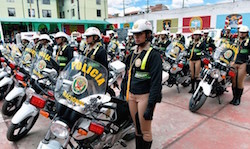In another worrying sign of official corruption in Peru and its impact on the drug trade, authorities have uncovered evidence of competing police groups that stole drug shipments leaving the country?s largest cocaine-producing region.
According to La Republica, investigations into four police officers and five civilians accused of trafficking drugs through the city of Cusco have revealed a network of corrupt police that robbed drug shipments coming from the Apurimac, Ene and Mantaro valley region (VRAEM).
The nine suspects were arrested in July after William Condori Huacac — a Peruvian National Police officer who worked in the region?s Criminal Investigation Division — was detained in possession of cocaine, unregistered weapons, and around $9,000 in cash.
An informant collaborating with government prosecutors said Condori Huacac led a group of police officers that stole from drug traffickers, reported La Republica. Additionally, the informant alleged the existence of a second group of corrupt police led by an officer that works in the VRAEM, and that the two networks compete over drug shipments passing through Cusco. (See La Republica’s graph below)
This second group is allegedly still active, and investigations have reportedly implicated a number of other police officials in the region.

InSight Crime Analysis
Corruption within the Peruvian police force has been a consistent problem, with nearly two dozen officers dismissed for ties to drug trafficking in September 2014. That same month, nearly 200 police were implicated in a criminal network led by a retired colonel.
SEE ALSO: Peru News and Profiles
This most recent case, however, raises concerns and frustrations over drug enforcement efforts in the VRAEM, Peru?s most important coca producing region. Given the massive quantities of cocaine moving out of this zone — much of which is trafficked into Bolivia via the so-called cocaine airbridge — there are strong financial incentives for security officials to partake in the local drug trade.
To make matters worse, the involvement of Peruvian security forces in illicit activities is not limited to drug trafficking, as police have also been known to facilitate extortion. And the recent seizure of 53 grenades in Lima has again raised suspicion of official complicity in the black market arms trade.
The involvement of security and judicial officials in criminal behavior creates some concerns over the potential abuse of measues intended to combat organized crime, such as Peru’s recently enacted shoot-down law and a legislative decree allowing police greater access to phone data.

